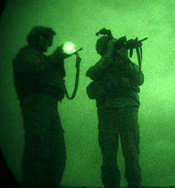 SyrVet, Inc., an Iowa-based distributor of livestock products, agreed to pay a $250,000 fine to the Bureau of Industry and Security (“BIS”) in connection with its unlicensed exports of cattle prods. Cattle prods and other discharge type arms such as stun guns are controlled by ECCN 0A985 and require a license for all destinations except Canada.
SyrVet, Inc., an Iowa-based distributor of livestock products, agreed to pay a $250,000 fine to the Bureau of Industry and Security (“BIS”) in connection with its unlicensed exports of cattle prods. Cattle prods and other discharge type arms such as stun guns are controlled by ECCN 0A985 and require a license for all destinations except Canada.
The $250,000 is payable, under the settlement agreement with BIS, in six quarterly installments of $16,666. The remaining $100,000 of the fine is suspended provided that Syrvet commits no further export violations between the date of the entry of the order and May 1, 2010.
I have wondered in a previous blog post the extent to which agricultural supply houses may be aware that cattle prods and the like require export licenses. In this case, the charging documents certainly suggest that SyrVet was aware of the license requirement.
Syrvet had reason to know that a license was required for the exports since, inter alia, they were sent a letter in October 2000 from a manufacturer of electric cattle prods which were sold by Syrvet, informing Syrvet that the items required a Department of Commerce (“DOC”) license to be exported. Additionally, Office of Export Enforcement (“OEE”) special agents conducted an outreach visit to SyrVet in August 2001, where they informed Syrvet employees of the licensing requirements for electric cattle prods.
Another factor suggesting that SyrVet was aware of the license requirement is that twelve of the exports charged by BIS were for exports to end-users for whom BIS licenses that SyrVet had already obtained had expired.
This case was commenced by BIS prior to enactment of legislation increasing permissible fines from $11,000 to $250,000 per violation, so BIS engaged in a little piling on to turn 16 exports into 38 counts of charged export violations. If each separate export had been a single violation, the maximum penalty would have been $176,000, not $250,000. The “piling on” was accomplished by charging each export as an illegal export under section 764.2(a) of the Export Administration Regulations and as an illegal export with knowledge of the violation under section 764.2(e), even though section 764.2(a) is a “lesser included offense” of any section 764.2(e) violation. Six of the exports were turned into three violations each by additional charges that SyrVet filed false shipper’s export declarations stating that no license was required for those exports in violation of section 764.2(g).
It’s hard to compare the fine imposed here to the value of the exported goods because BIS failed to post the schedule of violations that was attached to the charging letter and which would have revealed the value of the exported items.

 Posted by
Posted by  Category:
Category: 

 Luxembourg-based Qioptiq S.A.R.L.
Luxembourg-based Qioptiq S.A.R.L. 

